From O City of Byzantium by Niketas Choniates
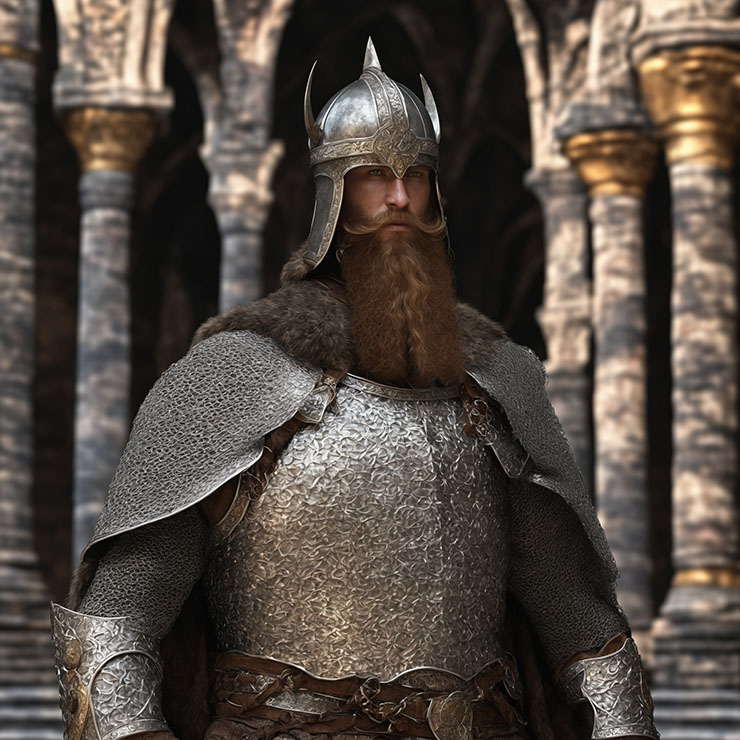
When Alexios approached the end of his life and lay in the splendid complex of the Monastery of Mangana, John, seeing his father at death's door and his mother's heart hardened against him, and his sister courting the empire, consulted with his relatives, chief among whom was his brother Isaakios, who supported his cause, as to the course of action to be taken. Undetected by his mother, he entered his father's bedchamber and, while embracing him as though in mourning, secretly removed the signet ring from his finger. Some say that he did so at his father's behest, which seems to be borne out by what shall be described shortly. Immediately thereafter, John gathered together his counselors and, announcing the action taken, took up arms, mounted his charger, and hastened toward the Great Palace. Both the Monastery of Mangana and the streets of the City were crowded with his supporters, and the assembled citizenry, having heard rumors of the events taking place, acclaimed him emperor.

John's mother, Empress Irene, was taken by surprise by the turn of events. She summoned her son and exhorted him to desist from his actions. As John was in complete charge of events and paid no attention whatsoever to his mother, she incited Bryennios to seize the throne with her support. But when she saw that Bryennios did nothing, she approached her husband who lay prostrate on his bed and whose only sign of life was his gasping for breath. She threw herself over his body and cried aloud against their son, shedding tears even as a fountain of dark water, that while Alexios was still among the living, John was stealing the throne with acts of rebellion. Alexios, however, did not respond to her accusation, in all likelihood giving his thoughts to more serious matters, such as his imminent departure from this life, and directing his gaze upon the angels who would lead his soul to the next world. While the empress was pleading with Alexios, vehemently protesting their son's actions, Alexios briefly forced a smile and raised his hands to heaven, perhaps rejoicing over the news and offering thanks to God, saying that it was but to mock and laugh at him that his wife should rant about his successor at a time his soul was taking leave of the body and when he should be atoning before God for whatever sins he may have committed. The woman, convinced that her husband was gloating over her protestations, with all her hope denied, the victim of false promises, sighed deeply and spoke: "0 husband, in life you excelled in all kinds of deceits, gilding your tongue with contradictory meaning, and even now as you are departing this life you remain unchanged from your former ways. When John reached the palace, he found the entrance barred to him by the guards, who were not satisfied with the display of the ring but demanded further evidence of his father's wish that he should be allowed nside. John's escort lifted the palace gates off their hinges with heavy bronze poles and threw them to the ground; then John entered with ease, together with his armed cohorts and relatives. Not a few of the promiscuous crowd who had followed along poured inside and began to seize everything in sight. When the gates were shut once again, those outside were barred from entering and those who had come through were forced to remain inside with the emperor for several days. And so passed the fifteenth day of the month of August [1181].
The following night, Emperor Alexios departed this life, having eigned thirty-seven years, four and one-half months." Promptly at dawn, he mother summoned John to join the funeral procession bearing his father's body to the Monastery of Christ Philanthropos, built by the deceased. John refused to heed her bidding, not because he wished to spurn his mother's authority or to show any disrespect for his father, but because he had not had sufficient time to secure the throne. He feared his rivals' inordinate passion to seize power. Like an octopus clinging to the rocks," John hugged the palace, but he allowed most of his kinsmen with him to join in his father's funeral procession.
A few days later, he permitted anyone who wished to do so to enter or leave the palace, since he was now in firm control of the government and administered the affairs of state according to his wishes. Conducting him- self with fair-mindedness before his relatives and close friends who approached him, he bestowed on each suitable honors. He showed himself to be one in body and mind with his brother Isaakios, to whom he was devoted. Isaakios had proved his love beyond all others, having contributed the most to John's accession to power. Once the empire had been set in order, John received him as an equal partner of his throne and table and allowed him to share in the public proclamation befitting the rank of sebastokrator, with which Isaakios had been honored by his father Alexios. John appointed the administrators of public affairs from among his blood relatives; John Komnenos he honored with the office of parakoimomenos, and Gregory Taronites as protovestiarios. John Komnenos, who administered his office without restraint, behaving pompously and with singular presumptuousness, was quickly relieved of his responsibility as administrator. Gregory, on the other hand, did not exceed or overstep the limits of his authority"" and thus remained in power much longer. Later, another Gregory, by the name of Kamateros, was associated in office with him. Kamateros was a learned man, and although he was not descended from a very distinguished or noble family, his services were enlisted by Emperor Alexios. Enrolled among the under secretaries, hemade the rounds of the provinces, where he amassed a great wealth derived from the taxes he assessed. He longed to be connected to the when he wedded one of his kinswomen, he was promoted logothete of the sekreta.
However, John Axuch was one who prevailed above all others in gaining the favor of the emperor and received the highest honors. He was a Turk by race, taken captive and offered as a gift to Emperor Alexios when Nicaea, the capital of Bithynia, was taken by the Western armies on their way to Palestine." Of the same age as Emperor John, he served as his playmate and became his dearest friend from among the domestics and chamberlains. When John ascended the throne, Axuch was awarded the office of grand domestic, and his influence was greatly increased; consequently, many of the emperor's distinguished relatives, on meeting him by chance, would dismount from their horses and make obeisance. Not only were his hands skilled in war"' but they were also quick and much beloved by all.
The first year of the emperor's reign had not yet run its course when his relatives - how, one cannot say - stitched up a plot against him, ranting and raving and casting the evil eye. A band of evil-working men, pledging good faith, rallied around Bryennios; because he had been educated in the liberal arts, displayed royal bearing, and was the most outstanding of those connected to the imperial family by marriage, they handed over the royal power to him. (As we have said elsewhere, he was married to the emperor's sister, Kaisarissa Anna, who was ardently devoted to philosophy, the queen of all the sciences, and was educated in every field of learning.) They probably would have struck quickly at night with murderous weapons while the emperor was encamped at Philopation, a place well suited for running horses and situated a little distance from the gates of the land walls, since they had previously plied the keeper of the gates with lavish bribes, had not Bryennios's customary sluggishness and languor forestalled any attempt to gain the throne and compelled him to remain immobilized, ignoring his compacts, and thus extinguishing the zeal of his partisans. It is said that Kaisarissa Anna, disgusted with her husband's frivolous behavior and distraught in her anger, and being a shrew by nature, felt justified in strongly contracting her vagina when Bryennios's penis entered deep inside her, thus causing him great pain.
When the conspirators were found out the next day, they were not maimed or flagellated, but they were deprived of their possessions, which, after some time, were returned to most of them. The emperor took pity first of all on the chief instigator of the plot, the kaisarissa Anna, for the following reason. The kaisarissa's gold and silver, her wealth of all kinds, and her diverse garments, had been collected in one room. Emperor John, standing there and gazing upon them, said, above rder of things has been inverted for me! Kinsmen have become the enemy, and strangers friends; it is only proper for this reason to turn these treasures over to friends." He commanded them all to be taken by the grand domestic, who thanked the emperor for his great generosity and asked for permission to speak freely. His request granted, he said, "Even though your sister has resorted to violent and wholly unjust means, 0 Emperor, and has renounced by these deeds her family ties, she did not thereby cast off her name and kinship. She remains, after all, the sister of a virtuous emperor and by repentance will recover, thanks to the ties of blood, your affection, which she has now lost through madness. 0 Master, spare your sister who has offended your majesty and chastise her with your loving-kindness, for she has already confessed to having been utterly defeated by your virtue. Give her also these things which lie before our eyes, not as payment of a just debt, but as a voluntary gift. They are more rightly hers than mine, being a paternal inheritance bequeathed to offspring." Persuaded by these words, or, more truthfully, shamed by them, the emperor eagerly granted the request, admitting, "I should be unworthy to rule should you be deemed more merciful than I towards my family and more above the temptation of excessive and easy gain." He restored everything to the kaisarissa and was reconciled with her.
Empress Irene, John's mother, was not implicated in the plot against her son. It is said rather that when she learned of the conspiracy, she phrased an aphorism: In the absence of a successor it is necessary to seek an emperor, but a reigning monarch must not be removed. "The anguish I would have suffered, thanks to what these butchers were planning for my son, would surely have been sharper than the pains I experienced in giving birth, for they thrust the infant into the light of day, while the former, penetrating my womb from the bowels of hell, would have caused me unending sorrow."
The emperor, seeing that the Turks were violating their treaties with his father, in great numbers overrunning the cities throughout Phrygia and along the Maeander, with the coming of spring marched against them. He emerged victorious from many battles. He built a wall around Laodikeia, after taking the city, and routed Alp-gara, who had been entrusted with her defense. Putting everything else in good order, he thought to return home. After a brief stay in Byzantion, he set out from the palace and once again became a tent dweller [spring 1120]. He guarded against incursions by the barbarians, well aware how devastating these could be if the Romans were caught unprepared. Consequently, he chose to remain on campaign for two compelling reasons: the defense of his own provinces, which is best achieved by being in the field, and the opportunity to train and drill the troops far removed from the cares of housekeeping. For an army, like a red-hot iron dipped into water, is tempered by the sweat of blazing battle.
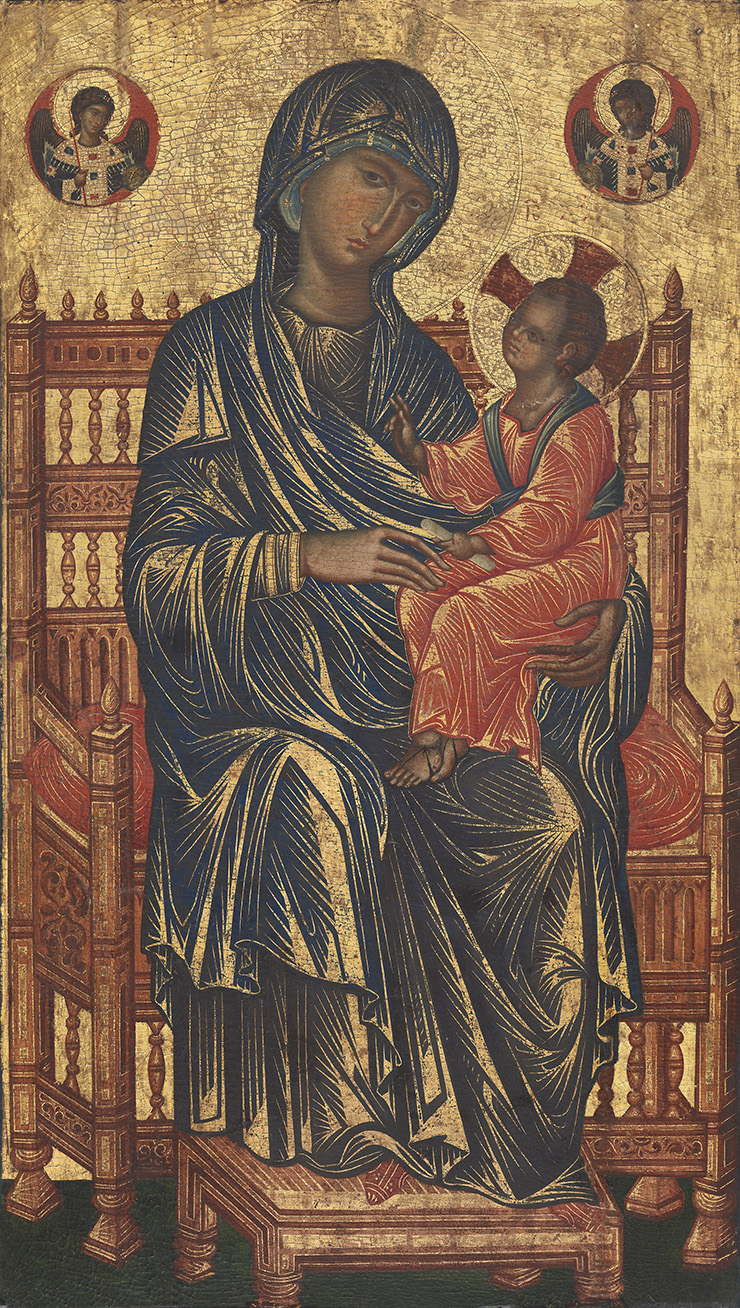
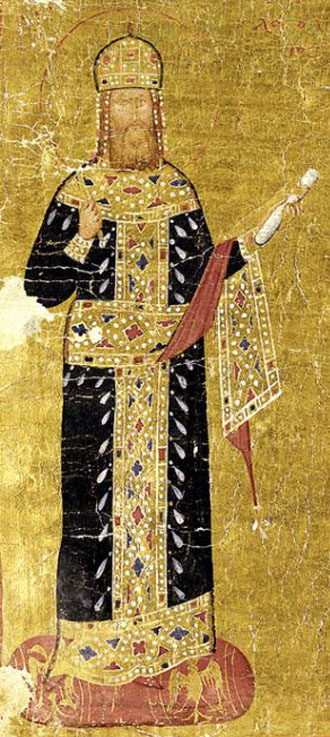
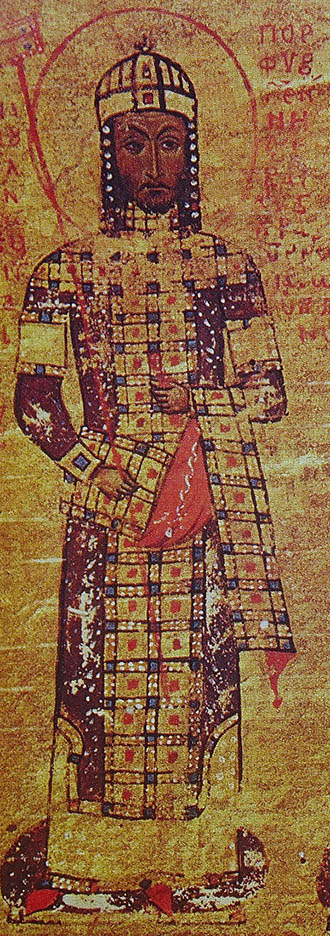
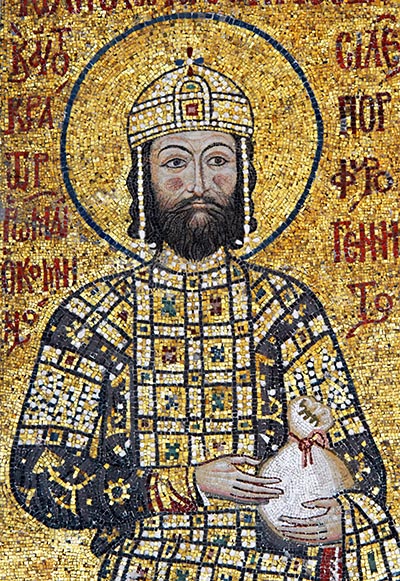
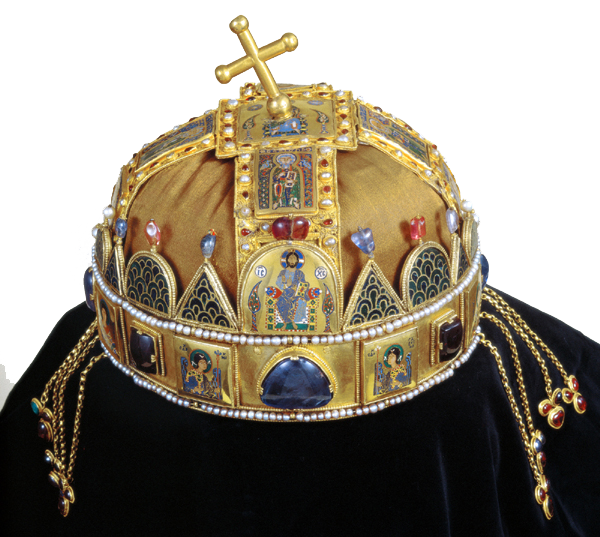








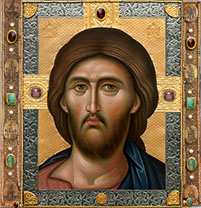 click here for icons of christ
click here for icons of christ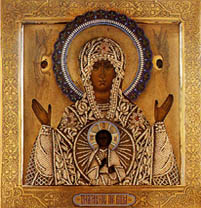 click here for icons of the theotokos
click here for icons of the theotokos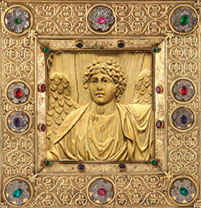 click here for icons of angels
click here for icons of angels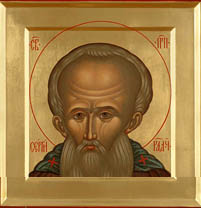 click here for icons of saints
click here for icons of saints








